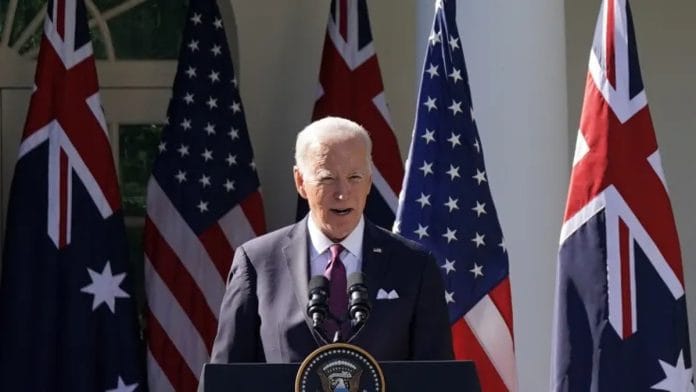New Delhi: US President Joe Biden Wednesday said he was “convinced” that one of the reasons behind Hamas’ attack on Israel, and its timing, was the work being done towards regional integration of Tel Aviv with the rest of the Middle East — a theory that strategic experts believe has a “valid context”.
“I’m convinced one of the reasons Hamas attacked when they did, and I have no proof of this, just my instinct tells me, is because of the progress we were making towards regional integration for Israel, and regional integration overall,” Biden told reporters at a press conference, also mentioning the announcement of the ambitious India-Middle East-Europe Economic Corridor (IMEEC) last month as a possible trigger.
Experts ThePrint spoke to said Biden’s hypothesis was valid if one looked at the context.
“The very potential of a project like the India-Middle East-Europe Economic Corridor relies on the normalisation of ties between Israel and the Middle East through the Abraham Accords,” Swasti Rao, an associate fellow at the Europe and Eurasia Centre, Manohar Parrikar Institute for Defence Studies and Analyses, said.
Harsh V. Pant, vice-president of studies and foreign policy at Observer Research Foundation, added that the ongoing developments in the region prior to Hamas’s 7 October attack would have marginalised certain actors.
“I would think that certainly, Hamas and Iran both would be uncomfortable with the rapprochement between Saudi Arabia and Israel. These developments in the region would marginalise both Hamas and Iran,” Pant said, cautioning, however, that any discussions to normalise ties being held by Saudi Arabia and Israel and mediated by the US, may not be as advanced as made out in public.
Nadeem Ahmed Moonakal, a research scholar at Rasanah International Institute for Iranian Studies in Riyadh, Saudi Arabia, pointed out that “the attack, though timed around talks regarding Saudi-Israel normalisation, also came amid several other important regional and global developments”.
“During this time, the collective emphasis on the Palestinian issue had relatively diminished… However, in the wake of this attack, the focus has again shifted to Palestine,” he told ThePrint.
The conflict between Hamas and Israel has claimed 1,400 lives in Israel and 7,000 in Hamas-controlled Gaza since 7 October, according to media reports.
Also Read: Yes, Israel has wronged Palestinians. But that’s not the immediate issue, terrorism is
Significance of Saudi Arabia-Israel rapprochement
A normalisation agreement between Saudi Arabia and Israel and further regional integration would have served Biden’s foreign policy goals and been projected as a “major victory” during his 2024 re-election campaign, pointed out Moonakal.
Furthermore, the dynamics of normalisation between Israel and Saudi Arabia are crucial to understanding the broader implications of Biden’s theory. The ongoing discussions highlight the delicate balance of power in the region and the necessity of addressing the Palestinian issue as a prerequisite for any lasting peace.
Rao said that Biden’s speculation could be understood by looking at the situation in West Asia. “Normalisation (of ties) between Israel and the Arab countries has two pillars — one with countries like Egypt, Jordan and (other) Abraham Accords signatories, which has been completed. The second pillar is ties with Saudi Arabia, which was close to completion,” she added.
“Certain actors would lose if this happened — especially the supporters of Hamas. After Hamas’ attacks on Israel and Tel Aviv’s counter-offensive, the normalisation that was underway between Saudi Arabia and Israel would have to wait. As a result, developments on IMEEC would also have to wait,” Rao said.
The evidence of the seriousness with which both Tel Aviv and Riyadh approached the reconciliation process was their reactions to the IMEEC, pointed out Pant.
“Israel was one of the first countries to congratulate the signatories of the IMEEC, while Saudi Arabia has been serious in its willingness to invest in the project. This is evidence that there was a genuine possibility for normalisation,” Pant said.
Normalisation ‘not possible’ without addressing Palestine issue
Moonakal, however, believes that normalisation of ties between Riyadh and Tel Aviv could not have been done without an agreement on Palestine.
“Saudi Arabia would find any agreement unacceptable if it fails to address the pressing and enduring concerns of the Palestinians, a stance which is in alignment with the Arab Peace Initiative. (Saudi) Crown Prince Mohammed bin Salman has maintained this consistent stance in his reaffirmations, even when responding to the recent attacks,” Moonakal said.
Pant concurred, saying that Riyadh would “definitely require certain concessions on Palestine”.
Tel Aviv seemed ready to offer them, he added.
The future now depends on how events unfold — especially the duration of the ongoing Hamas-Israel conflict. “The longer the war, the more difficult it would be for countries in the region to make any transformational move to further ties with Israel,” Pant said.
(Edited by Nida Fatima Siddiqui)
Also Read: Al-Aqsa violence: Why Palestinians & Jews have often clashed at this holy site in Jerusalem






